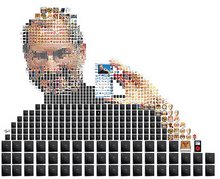This is interesting. Something I read from CNN (linked by Malaysiakini):
'Monitor Queen' of Malaysia gives computers a new lifeI didn't know that refurbishing old computers can be profitable, but I am more interested in the philanthropic aspect of the business.
POSTED: 1623 GMT (0023 HKT), May 3, 2007
PITTSBURGH, Pennsylvania (AP) -- In her native Malaysia, Mary Tiong developed a reputation for selling leftover computer monitors for a large manufacturer behind the industry's best-known brands. She earned a nickname: The Monitor Queen.
From her new base in Pittsburgh, Tiong continues to move large quantities of monitors. But now, she ships thousands of discarded models with computers back to Malaysia, where they are rebuilt and sold in poor countries, mostly in Southeast Asia.
Tiong, 41, says her company, Second Life Computer Remanufacturing, has environmental and philanthropic goals: It helps stem a rising tide of electronic waste in the United States and fulfills a need for basic computer equipment in the developing world.
(for rest of article, click here)
Considering that in places like Malaysia where a decent computer is usually priced from about RM1300-1500, PCs are not exactly very affordable items for most Malaysians who belong to the low income group. Refurbished PCs such as the ones mentioned in the news item could potentially help seed more households with this important tool for the information age, which otherwise would most likely have no means in some time to come to purchase one on their own.
However, a PC is only as good as the software that is running on it. And that is where I see there could be a limit to the potential of cheap refurbished computers. Software are known to be getting more and more bloated, and almost as soon as hardware sees a performance improvement or breakthrough, that difference is quickly negated by even more bloated software. I am not even talking about the latest and coolest software, but the normal stuff which was produced 5 or more years ago. As an example, I am currently using a P4 mobile laptop which was pretty decent in 2003, running Windows 2000 and Office 2000. But this machine will be practically useless if I try to load it with the latest software. Not only that, because of fatigue or whatever, my laptop is running the "old" applications slower and slower by the day. There are times when you could hardly do anything on it but wait for it to return control.
Unless the refurbished PCs can run decent software (there is really no point in running stripped down software which doesn't help bridge the information gap) on a decent pace, I do wonder how far such machines could help this country, and poorer ones, to play catch up. Just putting a machine in a classroom or living room with barely workable software will not help. Maybe those who have more experience in aid/welfare work, particularly dealing with people's access to information using PCs, will be able to provide more insight into this.



No comments:
Post a Comment